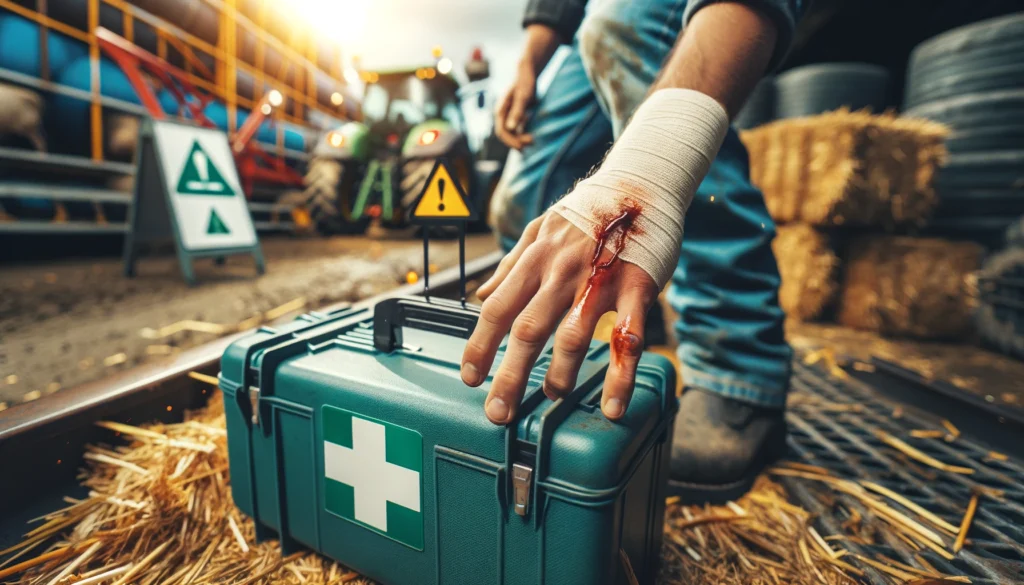
Agriculture Dictionary A close up shot depicting farm accidents. The focus is on a farmers hand reaching for a first aid kit with machinery and warning signs visible in th2.webp.webp
Definition: Farm Accidents
Farm accidents refer to unplanned events that result in injury, illness, or damage within an agricultural setting. These accidents can occur due to various hazards such as machinery malfunctions, falls, animal interactions, exposure to chemicals, and environmental factors. Farm accidents are a significant concern due to the inherent risks associated with agricultural work, which often involves heavy equipment, large animals, and exposure to hazardous substances. Preventing farm accidents through safety measures, training, and proper equipment maintenance is crucial for protecting the health and safety of farmers and farm workers.
Farm Accidents: An In-Depth Guide
Introduction
Farm accidents are a major concern in the agricultural industry, posing significant risks to the health and safety of farmers and farm workers. This guide explores the various types of farm accidents, their causes, and best practices for prevention and management. Understanding these factors can help farmers create a safer working environment and reduce the occurrence of accidents.
Fall off the barn roof and busted your keister? Life on the farm or ranch can be tough on the bum. Need a break? Laugh it off at FarmerCowboy.com, the #1 farm humor site. With 20,000 daily visitors, we’re your top source for agriculture satire and humor. Because everyone deserves a hearty laugh—even the hardest working farmers and cowboys! Join us and turn those long days into fun tales at FarmerCowboy.com.
Types of Farm Accidents
Farm accidents can be categorized based on their causes and the nature of the incidents:
1. Machinery Accidents
Machinery accidents are among the most common and severe types of farm accidents. They involve equipment such as tractors, combines, and other heavy machinery. Common causes include:
- Entanglement: Getting caught in moving parts of machinery.
- Rollovers: Tractors or other machinery overturning, often due to unstable terrain or improper operation.
- Collisions: Accidents involving machinery and other vehicles or objects.
2. Falls
Falls are another common type of farm accident, often resulting from working at heights or on uneven surfaces. Common scenarios include:
- Ladder Falls: Falling from ladders while performing tasks such as harvesting or maintenance.
- Falls from Heights: Falling from roofs, silos, or other elevated structures.
- Slips and Trips: Slipping on wet or uneven surfaces, leading to falls.
3. Animal-Related Accidents
Working with livestock poses various risks, including:
- Kicks and Bites: Injuries caused by animals kicking or biting.
- Stampedes: Being trampled or knocked over by a group of animals.
- Handling Injuries: Injuries sustained while restraining or moving animals.
4. Chemical Accidents
Exposure to agricultural chemicals such as pesticides and fertilizers can lead to:
- Poisoning: Ingesting or inhaling toxic substances.
- Skin Irritation: Contact with chemicals causing burns or allergic reactions.
- Eye Injuries: Chemical splashes leading to eye damage.
5. Environmental Accidents
Natural and environmental factors can also cause accidents, including:
- Weather-Related Incidents: Accidents caused by extreme weather conditions such as storms or heatwaves.
- Electrical Hazards: Contact with power lines or faulty electrical equipment.
- Fires: Accidental fires due to equipment malfunction or improper storage of flammable materials.
Causes of Farm Accidents
Several factors contribute to the occurrence of farm accidents, including:
- Lack of Training: Inadequate training on the safe operation of machinery and handling of animals.
- Poor Maintenance: Failure to properly maintain equipment, leading to malfunctions.
- Fatigue: Long working hours without adequate rest, leading to decreased alertness and coordination.
- Inadequate Safety Measures: Lack of protective equipment and safety protocols.
- Environmental Hazards: Uncontrolled environmental factors such as uneven terrain or extreme weather conditions.
Preventing Farm Accidents
Implementing effective safety measures can significantly reduce the risk of farm accidents. Best practices for prevention include:
1. Training and Education
- Comprehensive Training: Provide thorough training on the safe operation of machinery, handling of chemicals, and animal management.
- Regular Refresher Courses: Conduct periodic refresher courses to reinforce safety protocols and update workers on new safety practices.
2. Equipment Maintenance
- Routine Inspections: Perform regular inspections of machinery and equipment to identify and address potential issues.
- Preventive Maintenance: Implement a preventive maintenance schedule to ensure equipment is in good working condition.
- Safety Guards: Install safety guards on machinery to protect workers from moving parts.
3. Use of Personal Protective Equipment (PPE)
- Protective Gear: Ensure all workers use appropriate PPE, such as gloves, goggles, helmets, and safety boots.
- Chemical Safety: Provide PPE specifically designed for handling chemicals, such as respirators and chemical-resistant clothing.
4. Environmental Controls
- Safe Work Environment: Maintain a clean and organized work environment to minimize hazards.
- Weather Precautions: Monitor weather conditions and take precautions to protect workers from extreme weather.
- Electrical Safety: Ensure electrical equipment is properly installed and maintained to prevent accidents.
5. Emergency Preparedness
- First Aid Kits: Keep well-stocked first aid kits accessible in various locations on the farm.
- Emergency Plans: Develop and practice emergency response plans for different types of accidents.
- Emergency Contacts: Maintain a list of emergency contacts, including medical services and local authorities.
Case Study: Successful Implementation of Farm Safety Measures
The Johnson Family Farm
The Johnson family operates a 1,500-acre mixed crop and livestock farm. They successfully implemented comprehensive safety measures, leading to significant reductions in farm accidents. Key elements of their success included:
- Training Programs: The Johnsons provided extensive training on machinery operation, chemical handling, and animal management.
- Regular Maintenance: Routine maintenance and inspections of equipment prevented malfunctions and accidents.
- PPE Usage: Workers were equipped with appropriate PPE for various tasks, reducing injuries.
- Emergency Preparedness: The farm developed and practiced emergency response plans, ensuring readiness for any incident.
Results
The Johnson family’s commitment to safety led to a substantial reduction in farm accidents, improved worker morale, and increased productivity. Their proactive approach to safety also improved compliance with regulations and fostered a positive reputation within the community.
Conclusion
Farm accidents pose significant risks to the health and safety of farmers and farm workers. By implementing comprehensive safety measures, providing training, and promoting a safety-first culture, farmers can reduce the occurrence of accidents and create a safer working environment. Understanding the different types of farm accidents and best practices for their prevention and management is crucial for maximizing safety and ensuring the long-term success of a farm.
How Knowledge of Farm Accidents Can Help Farmers
Understanding farm accidents helps farmers make informed decisions about safety measures, training, and protocols. Knowledge of different types of farm accidents and their causes enables farmers to implement effective prevention strategies, enhance productivity, and ensure compliance with safety regulations. This understanding also supports sustainable farming practices and long-term agricultural success.
Resources for Further Reading
To further explore farm accidents and related topics, visit the following resources:

Originally posted 2009-05-24 11:08:04.
Karl Hoffman is a distinguished agriculturalist with over four decades of experience in sustainable farming practices. He holds a Ph.D. in Agronomy from Cornell University and has made significant contributions as a professor at Iowa State University. Hoffman’s groundbreaking research on integrated pest management and soil health has revolutionized modern agriculture. As a respected farm journalist, his column “Field Notes with Karl Hoffman” and his blog “The Modern Farmer” provide insightful, practical advice to a global audience. Hoffman’s work with the USDA and the United Nations FAO has enhanced food security worldwide. His awards include the USDA’s Distinguished Service Award and the World Food Prize, reflecting his profound impact on agriculture and sustainability.







Bohiney News finds humor in all the strangest parts of social life. Visit bohiney.com for more!